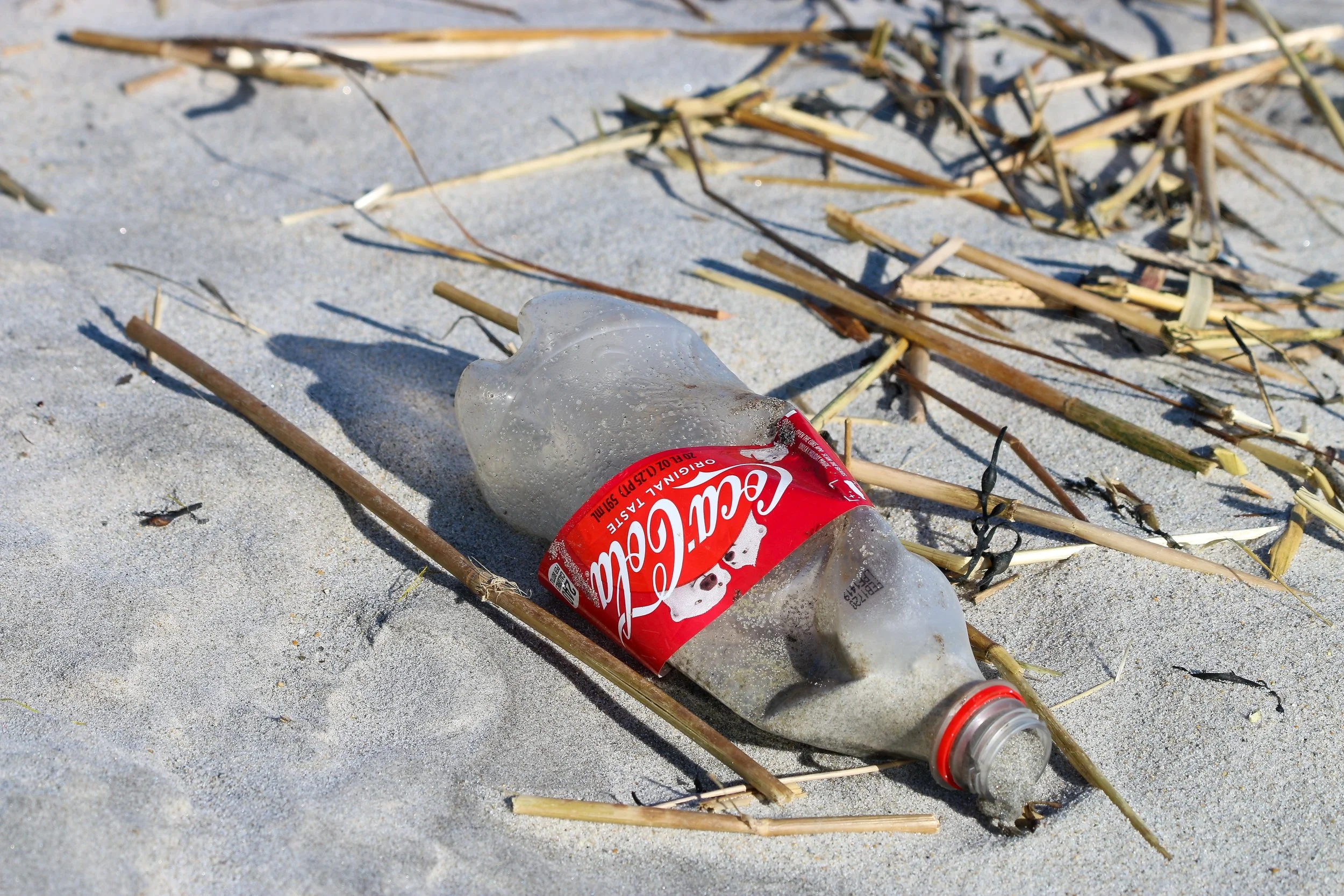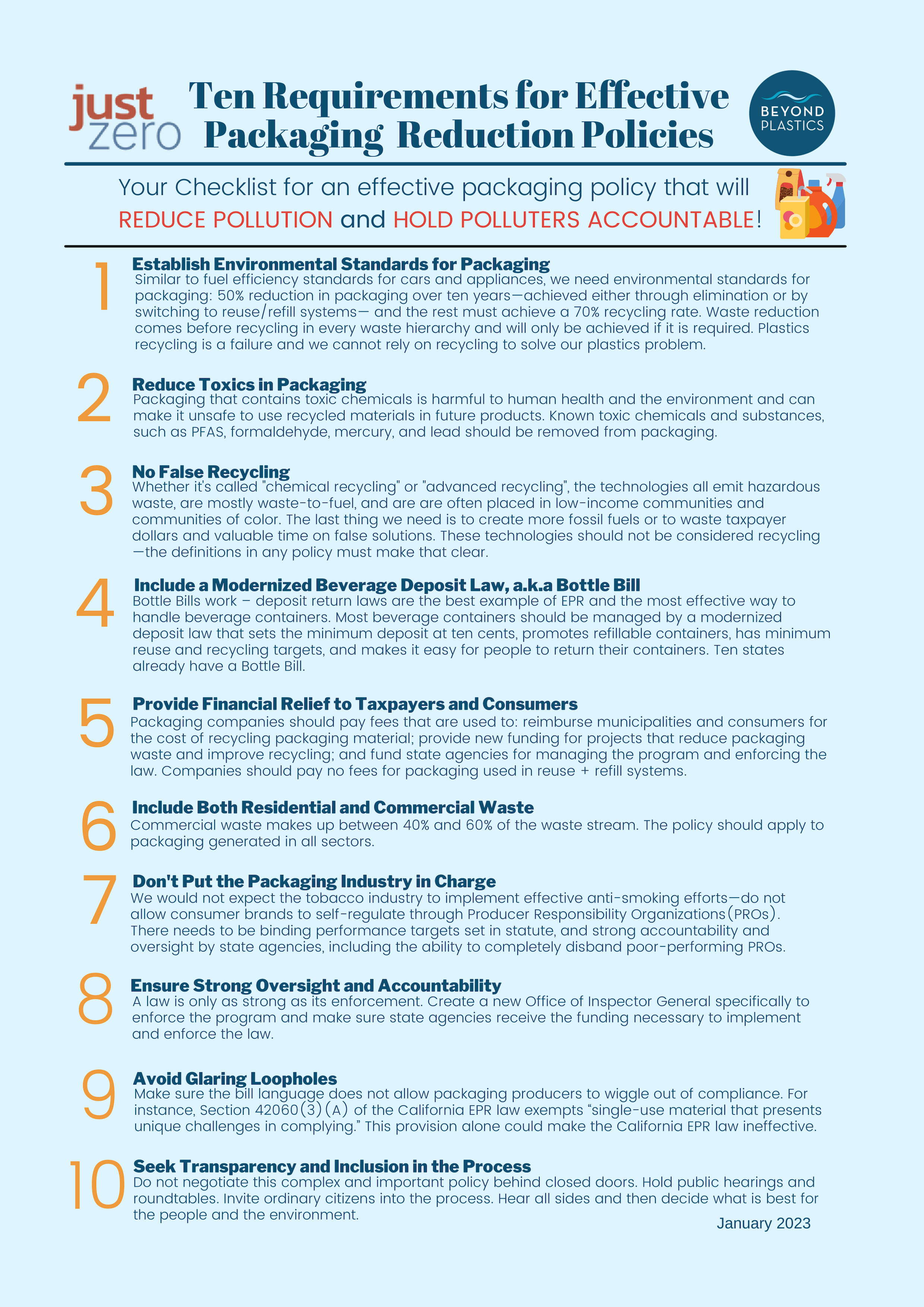EXTENDED PRODUCER RESPONSIBILITY (EPR)
If you’re looking for more information on the New York State Packaging Reduction & Recycling Infrastructure Act, please click here.
Extended producer responsibility (EPR) is a policy tool making producers legally and financially responsible for mitigating the environmental impacts of their products and packaging.
It’s a commonsense policy that’s been more widely adopted in Canada and the European Union. Although interest is growing here in the U.S., there are few existing EPR laws on the books - just a handful of states have mandated EPR programs for products like paint, batteries, and mattresses.
When done correctly, EPR policies can create jobs, reduce waste, preserve precious natural resources, decrease greenhouse gas emissions, and lighten the financial burden for the under-funded municipalities and agencies tasked with waste management and recycling.
Globally, packaging EPR programs are the most common, more than electronics, household hazardous waste, appliances, or any of the other programs developed to date. More than one billion people live in places where consumer goods companies pay some or all of the costs of packaging collection and recycling. With the exception of container-deposit laws (also known as “bottle bills”), the United States is the only country out of 34 members to the Organization for Economic Co-operation and Development (OECD) that does not have EPR for packaging programs established. Even non-OECD countries including Russia, Taiwan and several South American countries have passed and are implementing EPR for packaging programs.
A 2023 nationwide poll of U.S. voters found overwhelming support from both Republicans and Democrats for shifting the cost of cleaning up plastic pollution from taxpayers to the companies that make and use plastic.
However, EPR for packaging is gaining in popularity here in the U.S. and could be part of the solution to our growing packaging waste and plastic pollution crisis, but only if it is designed correctly.
In theory, shifting costs from taxpayers to the companies encourages companies to use less packaging and choose items that are more recyclable. But EPR will only achieve these outcomes if the legislation includes specific reduction requirements and standards for recyclability, recycled content and elimination of toxic substances.
For example, the European Union has had an EPR for packaging directive in place for years but has seen no reduction in packaging waste during that time although recycling rates have improved. Many EU countries are now adding specific waste reduction targets to their EPR systems in an attempt to improve the effectiveness of their programs.
The plastics and packaging producers see the writing on the wall – the public is demanding solutions to the ubiquitous problem of plastic pollution. In a recent global survey by the market research company IPSOS, 75% of respondents said they want single-use plastics banned.
Unfortunately, the plastics and packaging producers are now aggressively trying to co-opt EPR by throwing their support behind weak bills and seizing an opportunity to look like they’re doing something without doing much of anything. Many of the EPR for packaging bills backed by the industry put the polluters in the driver's seat and ask them to self-regulate. Can you imagine asking the tobacco industry to solve the smoking problem? Or asking fossil fuel companies to solve climate change? It simply won’t work.
Ten Requirements for Effective EPR
In order to be effective at reducing waste, Extended Producer Responsibility policies and programs must include the following ten pillars. Click here to download these ten requirements (PDF).>>
Model Packaging Reduction and Recycling Act
In partnership with Just Zero, we’ve developed a very strong model bill that includes all of the key pillars of effective Extended Producer Responsibility while avoiding common pitfalls.
Download the Model Packaging Reduction and Recycling Act. >>
If reading legislation is not your forte, we’ve created a memo that highlights the most important aspects of the Model Act. Download the Overview of the Model Packaging Reduction And Recycling Act. >>
Flow Chart
Extended Producer Responsibility is complicated! We’ve created this flow chart of the policy approach our Model Packaging Reduction and Recycling Act lays out to help make it easier to grasp.
RESOURCES
FACT SHEET: Why Colorado’s EPR Law Should Not Be Replicated - August 2024 (Beyond Plastics)
Ipsos Poll: Oceana National Plastic Pollution Survey (slides 52 & 53 deal with EPR) - February 2023 (Oceana)
CHART: comparison of the various EPR for packaging proposals in New York State - February 2023
Judith Enck’s written testimony to NY State Senate Ways & Means Committee about EPR legislation - February 2023
Model Packaging Reduction and Recycling Act - January 2023 (Beyond Plastics & Just Zero)
Overview of Model Packaging Reduction and Recycling - November 2022 (Beyond Plastics & Just Zero)
Ten Requirements of Effective EPR - January 2023 (Beyond Plastics & Just Zero)
Flow Chart of Model EPR Act Program Structure - November 2022 (Beyond Plastics & Just Zero)
Memo of Opposition to California SB 54 (EPR for packaging) - June 2022 (Beyond Plastics)
UNEA Overview on EPR - June 2022 (GAIA)
Comparison of NYS EPR Bills - May 24, 2022 (Beyond Plastics)
New York State Assembly Bill 10185 - Introduced in May 2022 by Assemblymember Steven Englebright
Memo of Support for NYS Assembly Bill 10185 - May 2022 (Beyond Plastics)
Reimagining The Bottle Bill - March 2022 (Reloop North America)
The Dark Side of EPR in British Columbia (BC Bottling & Recycling Depot Association)
6 Responsibilities of Extended Producer Responsibility for Packaging: Fact Sheet - March 2022 (Beyond Plastics, NYPIRG & All Our Energy)
Looking Back at 40 Years of New York State’s Bottle Bill - February 2022 (Container Recycling Institute)
Core Principles for Developing EPR Policy - March 2021 (Break Free From Plastic Pollution - US)
Memo of Critical Appraisal of Bill S118 - March 2021 (Manhattan & Brooklyn SWAB)
Letter Requesting Amendments to NYS EPR Bill - March 2021 (Beyond Plastics & NYPIRG)
Side-by-Side Comparison of NYS EPR Proposals - March 2021 (Beyond Plastics, NYPIRG, NHOC, All Our Energy, Southshore Audubon)
EPR Then and Now - March 2021 (UPSTREAM)
Comments About Chemical Recycling - February 2021 (GAIA - Global Alliance for Incinerator Alternatives)
Checklist for EPR - June 2019 (CalRecycle)
BEYOND RECYCLING: Extended Producer Responsibility And Plastic Pollution - August 2016 (UPSTREAM)
VIDEOS
Interview with Judith Enck on EPR, June 8, 2022 | Scripps National News
Beyond Plastics Series: Extended Producer Responsibility Master Class for Advocates | 2021
Recording of July 16, 2021 Extended Producer Responsibility Master Class for Advocates about British Columbia’s Extended Producer Responsibility Program with expert speaker, Allen Langdon, President and CEO of Encorp Pacific and moderated by Judith Enck, president and founder of Beyond Plastics and former EPA Region 2 Administrator








